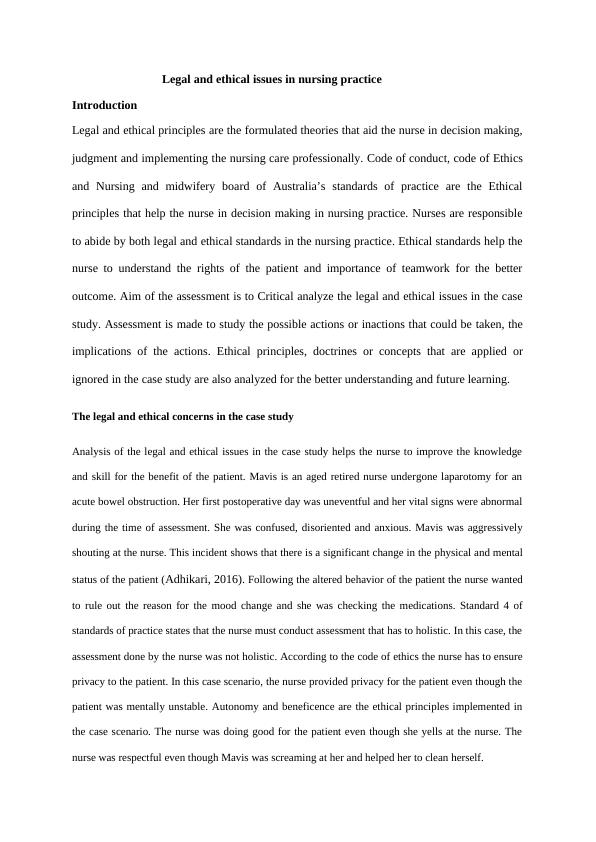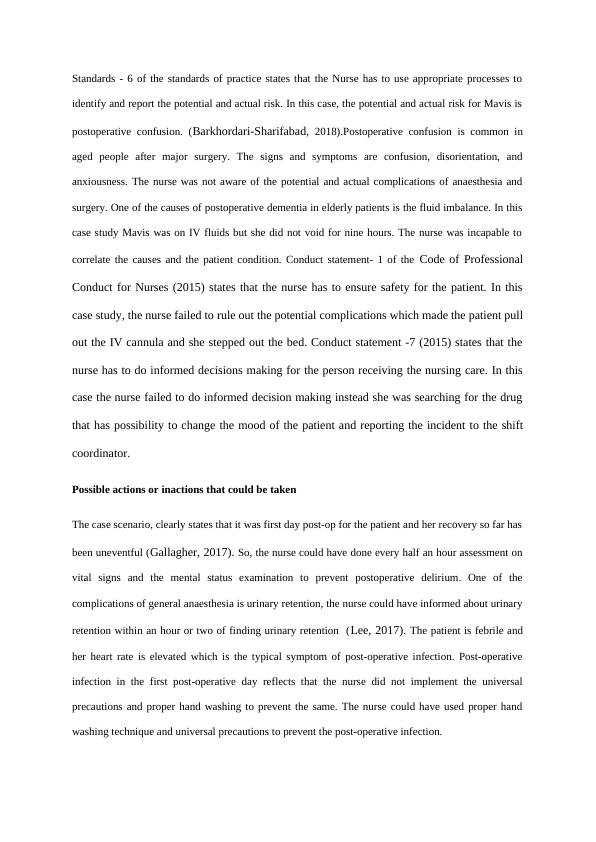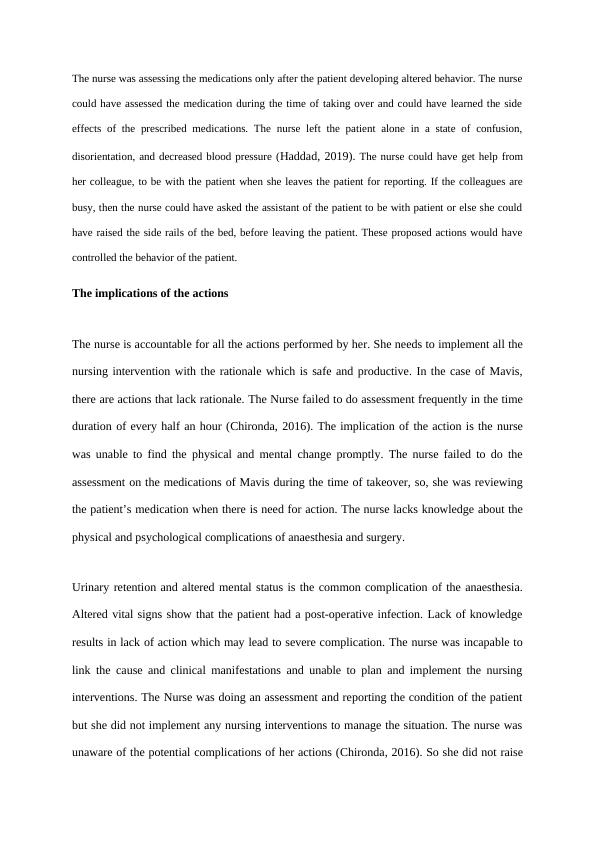Legal and ethical issues in nursing practice
Added on 2022-10-10
10 Pages2876 Words465 Views
Legal and ethical issues in nursing practice
Introduction
Legal and ethical principles are the formulated theories that aid the nurse in decision making,
judgment and implementing the nursing care professionally. Code of conduct, code of Ethics
and Nursing and midwifery board of Australia’s standards of practice are the Ethical
principles that help the nurse in decision making in nursing practice. Nurses are responsible
to abide by both legal and ethical standards in the nursing practice. Ethical standards help the
nurse to understand the rights of the patient and importance of teamwork for the better
outcome. Aim of the assessment is to Critical analyze the legal and ethical issues in the case
study. Assessment is made to study the possible actions or inactions that could be taken, the
implications of the actions. Ethical principles, doctrines or concepts that are applied or
ignored in the case study are also analyzed for the better understanding and future learning.
The legal and ethical concerns in the case study
Analysis of the legal and ethical issues in the case study helps the nurse to improve the knowledge
and skill for the benefit of the patient. Mavis is an aged retired nurse undergone laparotomy for an
acute bowel obstruction. Her first postoperative day was uneventful and her vital signs were abnormal
during the time of assessment. She was confused, disoriented and anxious. Mavis was aggressively
shouting at the nurse. This incident shows that there is a significant change in the physical and mental
status of the patient (Adhikari, 2016). Following the altered behavior of the patient the nurse wanted
to rule out the reason for the mood change and she was checking the medications. Standard 4 of
standards of practice states that the nurse must conduct assessment that has to holistic. In this case, the
assessment done by the nurse was not holistic. According to the code of ethics the nurse has to ensure
privacy to the patient. In this case scenario, the nurse provided privacy for the patient even though the
patient was mentally unstable. Autonomy and beneficence are the ethical principles implemented in
the case scenario. The nurse was doing good for the patient even though she yells at the nurse. The
nurse was respectful even though Mavis was screaming at her and helped her to clean herself.
Introduction
Legal and ethical principles are the formulated theories that aid the nurse in decision making,
judgment and implementing the nursing care professionally. Code of conduct, code of Ethics
and Nursing and midwifery board of Australia’s standards of practice are the Ethical
principles that help the nurse in decision making in nursing practice. Nurses are responsible
to abide by both legal and ethical standards in the nursing practice. Ethical standards help the
nurse to understand the rights of the patient and importance of teamwork for the better
outcome. Aim of the assessment is to Critical analyze the legal and ethical issues in the case
study. Assessment is made to study the possible actions or inactions that could be taken, the
implications of the actions. Ethical principles, doctrines or concepts that are applied or
ignored in the case study are also analyzed for the better understanding and future learning.
The legal and ethical concerns in the case study
Analysis of the legal and ethical issues in the case study helps the nurse to improve the knowledge
and skill for the benefit of the patient. Mavis is an aged retired nurse undergone laparotomy for an
acute bowel obstruction. Her first postoperative day was uneventful and her vital signs were abnormal
during the time of assessment. She was confused, disoriented and anxious. Mavis was aggressively
shouting at the nurse. This incident shows that there is a significant change in the physical and mental
status of the patient (Adhikari, 2016). Following the altered behavior of the patient the nurse wanted
to rule out the reason for the mood change and she was checking the medications. Standard 4 of
standards of practice states that the nurse must conduct assessment that has to holistic. In this case, the
assessment done by the nurse was not holistic. According to the code of ethics the nurse has to ensure
privacy to the patient. In this case scenario, the nurse provided privacy for the patient even though the
patient was mentally unstable. Autonomy and beneficence are the ethical principles implemented in
the case scenario. The nurse was doing good for the patient even though she yells at the nurse. The
nurse was respectful even though Mavis was screaming at her and helped her to clean herself.

Standards - 6 of the standards of practice states that the Nurse has to use appropriate processes to
identify and report the potential and actual risk. In this case, the potential and actual risk for Mavis is
postoperative confusion. (Barkhordari-Sharifabad, 2018).Postoperative confusion is common in
aged people after major surgery. The signs and symptoms are confusion, disorientation, and
anxiousness. The nurse was not aware of the potential and actual complications of anaesthesia and
surgery. One of the causes of postoperative dementia in elderly patients is the fluid imbalance. In this
case study Mavis was on IV fluids but she did not void for nine hours. The nurse was incapable to
correlate the causes and the patient condition. Conduct statement- 1 of the Code of Professional
Conduct for Nurses (2015) states that the nurse has to ensure safety for the patient. In this
case study, the nurse failed to rule out the potential complications which made the patient pull
out the IV cannula and she stepped out the bed. Conduct statement -7 (2015) states that the
nurse has to do informed decisions making for the person receiving the nursing care. In this
case the nurse failed to do informed decision making instead she was searching for the drug
that has possibility to change the mood of the patient and reporting the incident to the shift
coordinator.
Possible actions or inactions that could be taken
The case scenario, clearly states that it was first day post-op for the patient and her recovery so far has
been uneventful (Gallagher, 2017). So, the nurse could have done every half an hour assessment on
vital signs and the mental status examination to prevent postoperative delirium. One of the
complications of general anaesthesia is urinary retention, the nurse could have informed about urinary
retention within an hour or two of finding urinary retention (Lee, 2017). The patient is febrile and
her heart rate is elevated which is the typical symptom of post-operative infection. Post-operative
infection in the first post-operative day reflects that the nurse did not implement the universal
precautions and proper hand washing to prevent the same. The nurse could have used proper hand
washing technique and universal precautions to prevent the post-operative infection.
identify and report the potential and actual risk. In this case, the potential and actual risk for Mavis is
postoperative confusion. (Barkhordari-Sharifabad, 2018).Postoperative confusion is common in
aged people after major surgery. The signs and symptoms are confusion, disorientation, and
anxiousness. The nurse was not aware of the potential and actual complications of anaesthesia and
surgery. One of the causes of postoperative dementia in elderly patients is the fluid imbalance. In this
case study Mavis was on IV fluids but she did not void for nine hours. The nurse was incapable to
correlate the causes and the patient condition. Conduct statement- 1 of the Code of Professional
Conduct for Nurses (2015) states that the nurse has to ensure safety for the patient. In this
case study, the nurse failed to rule out the potential complications which made the patient pull
out the IV cannula and she stepped out the bed. Conduct statement -7 (2015) states that the
nurse has to do informed decisions making for the person receiving the nursing care. In this
case the nurse failed to do informed decision making instead she was searching for the drug
that has possibility to change the mood of the patient and reporting the incident to the shift
coordinator.
Possible actions or inactions that could be taken
The case scenario, clearly states that it was first day post-op for the patient and her recovery so far has
been uneventful (Gallagher, 2017). So, the nurse could have done every half an hour assessment on
vital signs and the mental status examination to prevent postoperative delirium. One of the
complications of general anaesthesia is urinary retention, the nurse could have informed about urinary
retention within an hour or two of finding urinary retention (Lee, 2017). The patient is febrile and
her heart rate is elevated which is the typical symptom of post-operative infection. Post-operative
infection in the first post-operative day reflects that the nurse did not implement the universal
precautions and proper hand washing to prevent the same. The nurse could have used proper hand
washing technique and universal precautions to prevent the post-operative infection.

The nurse was assessing the medications only after the patient developing altered behavior. The nurse
could have assessed the medication during the time of taking over and could have learned the side
effects of the prescribed medications. The nurse left the patient alone in a state of confusion,
disorientation, and decreased blood pressure (Haddad, 2019). The nurse could have get help from
her colleague, to be with the patient when she leaves the patient for reporting. If the colleagues are
busy, then the nurse could have asked the assistant of the patient to be with patient or else she could
have raised the side rails of the bed, before leaving the patient. These proposed actions would have
controlled the behavior of the patient.
The implications of the actions
The nurse is accountable for all the actions performed by her. She needs to implement all the
nursing intervention with the rationale which is safe and productive. In the case of Mavis,
there are actions that lack rationale. The Nurse failed to do assessment frequently in the time
duration of every half an hour (Chironda, 2016). The implication of the action is the nurse
was unable to find the physical and mental change promptly. The nurse failed to do the
assessment on the medications of Mavis during the time of takeover, so, she was reviewing
the patient’s medication when there is need for action. The nurse lacks knowledge about the
physical and psychological complications of anaesthesia and surgery.
Urinary retention and altered mental status is the common complication of the anaesthesia.
Altered vital signs show that the patient had a post-operative infection. Lack of knowledge
results in lack of action which may lead to severe complication. The nurse was incapable to
link the cause and clinical manifestations and unable to plan and implement the nursing
interventions. The Nurse was doing an assessment and reporting the condition of the patient
but she did not implement any nursing interventions to manage the situation. The nurse was
unaware of the potential complications of her actions (Chironda, 2016). So she did not raise
could have assessed the medication during the time of taking over and could have learned the side
effects of the prescribed medications. The nurse left the patient alone in a state of confusion,
disorientation, and decreased blood pressure (Haddad, 2019). The nurse could have get help from
her colleague, to be with the patient when she leaves the patient for reporting. If the colleagues are
busy, then the nurse could have asked the assistant of the patient to be with patient or else she could
have raised the side rails of the bed, before leaving the patient. These proposed actions would have
controlled the behavior of the patient.
The implications of the actions
The nurse is accountable for all the actions performed by her. She needs to implement all the
nursing intervention with the rationale which is safe and productive. In the case of Mavis,
there are actions that lack rationale. The Nurse failed to do assessment frequently in the time
duration of every half an hour (Chironda, 2016). The implication of the action is the nurse
was unable to find the physical and mental change promptly. The nurse failed to do the
assessment on the medications of Mavis during the time of takeover, so, she was reviewing
the patient’s medication when there is need for action. The nurse lacks knowledge about the
physical and psychological complications of anaesthesia and surgery.
Urinary retention and altered mental status is the common complication of the anaesthesia.
Altered vital signs show that the patient had a post-operative infection. Lack of knowledge
results in lack of action which may lead to severe complication. The nurse was incapable to
link the cause and clinical manifestations and unable to plan and implement the nursing
interventions. The Nurse was doing an assessment and reporting the condition of the patient
but she did not implement any nursing interventions to manage the situation. The nurse was
unaware of the potential complications of her actions (Chironda, 2016). So she did not raise

End of preview
Want to access all the pages? Upload your documents or become a member.
Related Documents
Introduction Nurses Play a Critical Role Assignment 2022lg...
|7
|2121
|30
Ethical and Legal issues in nursing Discussion 2022lg...
|11
|3094
|21
Overview of the case study Scenario 2022lg...
|11
|3042
|40
Legal and Ethical Duties of Nurses | Case Study Analysislg...
|9
|2644
|9
Nursing Assignment | Assessment | 1lg...
|12
|3088
|14
Ethical and Legal Issues in Nursinglg...
|10
|2452
|1
